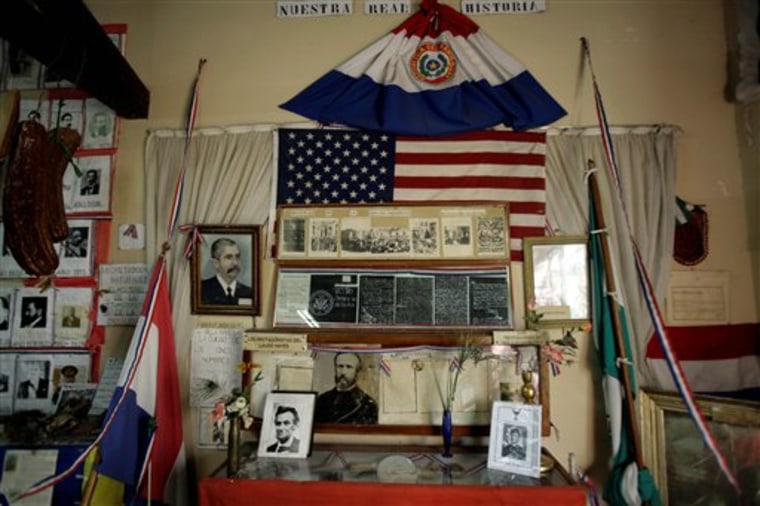As the U.S. celebrates Presidents Day on Monday, citizens of this small South American country wonder why anyone would overlook Rutherford B. Hayes.
Forget Lincoln or Washington. Hayes — a one-term U.S. president who is undistinguished at home — has a holiday, a province, a town, a museum and a soccer team all named in his honor, thanks to an 1878 arbitration in which he handed Paraguay 60 percent of its land.
"If it weren't for Hayes, Paraguay would have a smaller territory than it has today," said Salvador Garozzo, director of the municipal museum in the town of Villa Hayes, capital of Presidente Hayes province.
After a regional war in the late 1800s, Argentina and Paraguay asked the United States to decide a bitter dispute over Paraguay's Chaco region — a swath of blistering-hot terrain about the size of Michigan that today is an important source of cattle ranching.
Archives indicate that a low-level State Department official most likely drew up the ruling that Secretary of State William Evarts then handed to Hayes to sign, said Tom Culbertson, executive director of Rutherford B. Hayes Presidential Center in Fremont, Ohio.
It was a decision that "only occupied a few hours of his life," Culbertson said.
No matter. The Nov. 12, 1878, decision is celebrated every year with a provincial holiday.
'Los Yanquis'
Asuncion's Presidente Hayes soccer club — nicknamed "Los Yanquis" — won the Paraguayan championship in 1952. And last year the U.S. Embassy held a Rutherford B. Hayes postage stamp design contest, awarding a digital camera to the winner on the 130th anniversary of the ruling.
In the late 1990s, a Paraguayan TV show fulfilled a 17-year-old girl's wish after she miraculously emerged from a coma by giving her an all-expense-paid trip to Ohio to see the Hayes Presidential Center.
"It appears that they have sort of an inflated view of Hayes' importance in American history," Culbertson said. "One article said that they thought he was revered only behind Abraham Lincoln within the United States, which certainly isn't the case."
Rather, the 19th U.S. president — a Harvard-educated lawyer like the current president — had the nickname "Rutherfraud" after losing the popular vote in the 1876 election that was marred by allegations of fraud and voter intimidation. A special congressional commission sorting out disputed electoral college votes named him the winner in 1877.
Not to be confused with the Ohio president who got caught in the Teapot Dome scandal (Warren G. Harding) or the one who got stuck in the bathtub (William H. Taft), Hayes was the only U.S. president to be wounded in the Civil War — five times, once seriously.
He was also long considered to have turned his back on freed slaves by pulling back federal troops in the post-Civil War South, allowing white former slave owners to retake power — although historians now say the end of Reconstruction was inevitable.
'A vanilla kind of guy'
In a 2005 survey commissioned by the Wall Street Journal, 130 academics ranked Hayes 24th among 40 presidents — the bottom rung in the "average presidents" category.
His most popular decision likely came in 1880 — not to run for a second term.
"There aren't a lot of cute Rutherford B. Hayes stories," said presidential historian Brooks D. Simpson. "I guess he has his fans, but I just see him as a vanilla kind of guy."
In fact, details of Hayes' arbitration decision are fading even in Villa Hayes, where on a recent morning 10 adults waiting for treatment at a public hospital confessed to not knowing who he was.
"Students are generally aware that Hayes was a former 'gringo' president," said Maximo Benitez, a teacher at the local school, where children call a Hayes bust outside "the man without arms." "But they don't know what he did because even though it's taught, it happened so long ago that they don't care."
